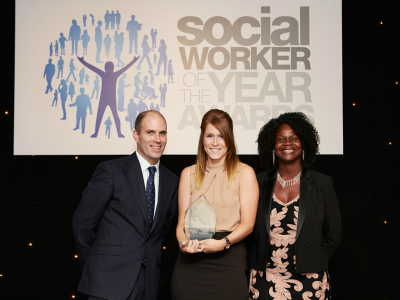
“It was about responding faster to young people’s needs,” says social worker of the year, Helen Pye, of the changes she’s championed since joining the forensic child and adolescent mental health service at South West Yorkshire’s NHS trust.
When Pye joined the Focus team in 2012, staff were completing lengthy reports of 70 pages plus, which meant equally long waiting times for young people. Her first step was to suggest and lead on the introduction of shorter, more specialist risk assessments.
“I was fortunate enough to have the experience of referring into the team prior to actually working here so I used that knowledge, and my knowledge of working in child protection services, to think about what referrers actually want,” she says.
“Did they want to wait a long time for something extremely comprehensive or was it actually more important to respond faster and think more specifically about what was being asked?”
This change has since resulted in a much faster throughput of cases and has enabled young people to access specialist help within 48 hours of being referred to the service.
‘Improving access’
Pye also used her experience of working in Wakefield’s busy child protection team to persuade her new health colleagues to open up referral pathways to social care.
“I’d been aware of a number of cases that would fit the team’s criteria when working for the local authority, but there were no clear pathways for social workers to refer,” she says.
“It made sense that I promoted that to the team and supported them to recognise there were a number of young people who couldn’t access the service because the pathways were a little bit more restrictive.”
‘Back to basics’
Pye’s colleagues describe her contribution to service improvements as ‘crucial’ and she was praised by judges at the Social Worker of the Year Awards for championing the value of social work in a health environment – something she says has only been possible due to her team.
“My team are receptive to thinking about other disciplines and how social work might ultimately benefit the work we do and the young people we work with,” she says. “It’s been really good for me and has made me think about the ‘back to basics’ of what social work is all about.”
“When you come from a team of social workers you maybe don’t analyse it too much because it’s just the way everyone works,” she adds. “But when you’re working with people who practise in such different ways, it’s something that is at the forefront of your mind.”
Pye was also the only social worker invited to advise on draft scope guidance on Harmful Sexual Behaviour, which is currently being produced by the National Institute for Health and Care Excellence. “It was such a fantastic opportunity to go and be part of that,” she says.
‘Best decision ever’
It’s hard to believe that Pye fell into social work by complete accident – she always knew she wanted a career working with people but applied to university on a bit of a whim after a friend suggested social work. It wasn’t until she was studying for a degree in the subject that she thought “god I absolutely love this and it’s the best decision ever”.
But while she has racked up an impressive list of strategic level achievements, Pye also continues to manage a high and complex caseload, which remains her real passion.
“My favourite thing about being a social worker is working directly with children and young people,” she says. “Whether that be assessment or intervention – just spending time with them, building relationships and knowing I’ve contributed to their lives is what I enjoy most.”


 Bournemouth, Christchurch and Poole
Bournemouth, Christchurch and Poole  Hampshire County Council
Hampshire County Council  Lincolnshire County Council
Lincolnshire County Council  Norfolk County Council
Norfolk County Council  Northamptonshire Children’s Trust
Northamptonshire Children’s Trust  South Gloucestershire Council
South Gloucestershire Council  Wiltshire Council
Wiltshire Council  Wokingham Borough Council
Wokingham Borough Council  Children and young people with SEND are ‘valued and prioritised’ in Wiltshire, find inspectors
Children and young people with SEND are ‘valued and prioritised’ in Wiltshire, find inspectors  How specialist refugee teams benefit young people and social workers
How specialist refugee teams benefit young people and social workers  Podcast: returning to social work after becoming a first-time parent
Podcast: returning to social work after becoming a first-time parent  Podcast: would you work for an inadequate-rated service?
Podcast: would you work for an inadequate-rated service?  Family help: one local authority’s experience of the model
Family help: one local authority’s experience of the model  Workforce Insights – showcasing a selection of the sector’s top recruiters
Workforce Insights – showcasing a selection of the sector’s top recruiters 

 Facebook
Facebook X
X LinkedIn
LinkedIn Instagram
Instagram
Congratulations and well done Helen! I hope your example inspires others.